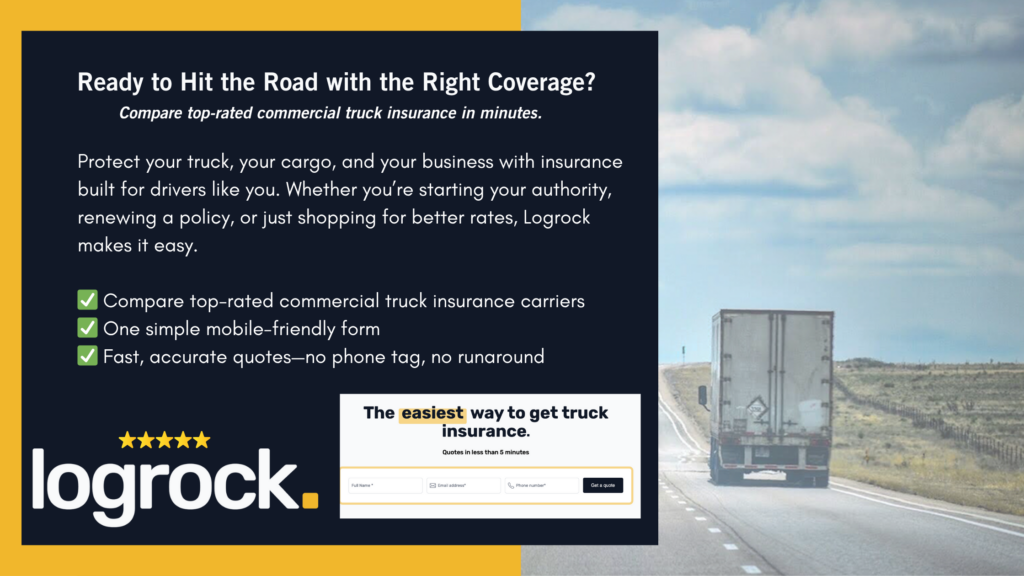Whether you’re hauling freight across state lines or making local deliveries, commercial trucking insurance is a must. But what exactly does it cover, and how much does it cost in 2025?
In this FAQ-style guide, we break it all down—using recent data, clear definitions, and insights truckers can trust.
What Is Commercial Trucking Insurance?
Commercial trucking insurance is a policy designed to protect trucks, drivers, cargo, and businesses from financial losses due to accidents, theft, breakdowns, and liability claims. Unlike personal auto insurance, this coverage is built for heavy-duty commercial vehicles and the unique risks of the trucking industry.
What Does It Cover?
Typical commercial trucking insurance includes several types of coverage. Here’s a quick breakdown:
| Type of Coverage | What It Covers |
| Auto Liability | Bodily injury or property damage to others caused by your truck |
| Physical Damage | Repairs to your own truck due to collision, fire, theft, or vandalism |
| Motor Truck Cargo | Loss or damage to the cargo you’re hauling |
| General Liability | Coverage for business-related risks outside of operating the truck |
| Bobtail/Non-Trucking Use | Coverage when the truck is used without a trailer or not under dispatch |
| Trailer Interchange | Damage to non-owned trailers under interchange agreements |
(Source: National Association of Insurance Commissioners)
What’s the Average Cost of Trucking Insurance in 2025?
According to 2024 industry data from the American Transportation Research Institute, average annual premiums vary by operation type and location:
| Type of Operation | Average Annual Premium (2024) |
| Owner-Operator (Lease On) | $4,500 – $7,000 |
| Owner-Operator (Authority) | $9,000 – $16,000+ |
| Small Fleet (3–10 trucks) | $12,000 – $25,000 per truck |
| New Authority (First Year) | $15,000 – $30,000+ per truck |
(Source: ATRI Operational Costs Report, 2024)
Key Factors That Affect Cost:
- Driving record
- Truck value and type
- USDOT safety history
- Operating radius
- Cargo type
- Location and garaging ZIP code
Who Needs Commercial Truck Insurance?
If you operate any of the following, you’re likely required by law to carry commercial trucking insurance:
- Owner-operators with their own authority
- For-hire carriers
- Freight brokers who own assets
- Private fleets or logistics companies
- Hotshot and box truck drivers
FMCSA regulations mandate a minimum liability coverage of $750,000 to $5 million, depending on cargo type. Most brokers require at least $1 million in coverage to work with you (FMCSA, 2025).
Can I Get Commercial Truck Insurance Online?
Yes—and that’s where platforms like Logrock come in.
We make it easy to get multiple trucking insurance quotes with just one application, using smart tools like:
- FMCSA lookup to auto-fill your DOT info
- VIN decoder for faster truck details
- Google Maps address autofill
It’s trucking insurance, built for the road. Be sure to check out our other blogs for a deeper look at what makes our mobile-friendly quote form stand out—and get valuable insights on insurance for new authorities, renewals, and more.
–Built for the Road: Why Our Mobile-First Quote Form Matters
–Why Do You Need Commercial Trucking Insurance?
–Affordable Trucking Insurance: How to Save Big on Coverage
–How To Prepare for the FMCSA Authority Application
Final Take: Why Commercial Truck Insurance Matters
Trucking is the backbone of the U.S. economy—but it comes with serious risk. One accident, cargo loss, or claim could put your entire operation at risk. Commercial trucking insurance protects you, your business, and your future on the road.
Ready to start saving? Get A Quote in Minutes!

Sources:
- National Association of Insurance Commissioners (2024). Commercial Auto Insurance Overview. Retrieved from naic.org
- American Transportation Research Institute (2024). Operational Costs of Trucking. Retrieved from truckingresearch.org
- Federal Motor Carrier Safety Administration (2025). Minimum Insurance Requirements. Retrieved from fmcsa.dot.gov
Leave a Reply